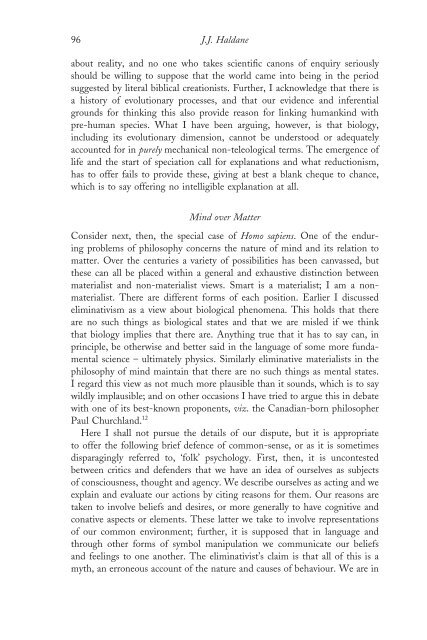Atheism and Theism JJ Haldane - Common Sense Atheism
Atheism and Theism JJ Haldane - Common Sense Atheism
Atheism and Theism JJ Haldane - Common Sense Atheism
You also want an ePaper? Increase the reach of your titles
YUMPU automatically turns print PDFs into web optimized ePapers that Google loves.
96 J.J. <strong>Haldane</strong><br />
about reality, <strong>and</strong> no one who takes scientific canons of enquiry seriously<br />
should be willing to suppose that the world came into being in the period<br />
suggested by literal biblical creationists. Further, I acknowledge that there is<br />
a history of evolutionary processes, <strong>and</strong> that our evidence <strong>and</strong> inferential<br />
grounds for thinking this also provide reason for linking humankind with<br />
pre-human species. What I have been arguing, however, is that biology,<br />
including its evolutionary dimension, cannot be understood or adequately<br />
accounted for in purely mechanical non-teleological terms. The emergence of<br />
life <strong>and</strong> the start of speciation call for explanations <strong>and</strong> what reductionism,<br />
has to offer fails to provide these, giving at best a blank cheque to chance,<br />
which is to say offering no intelligible explanation at all.<br />
Mind over Matter<br />
Consider next, then, the special case of Homo sapiens. One of the enduring<br />
problems of philosophy concerns the nature of mind <strong>and</strong> its relation to<br />
matter. Over the centuries a variety of possibilities has been canvassed, but<br />
these can all be placed within a general <strong>and</strong> exhaustive distinction between<br />
materialist <strong>and</strong> non-materialist views. Smart is a materialist; I am a nonmaterialist.<br />
There are different forms of each position. Earlier I discussed<br />
eliminativism as a view about biological phenomena. This holds that there<br />
are no such things as biological states <strong>and</strong> that we are misled if we think<br />
that biology implies that there are. Anything true that it has to say can, in<br />
principle, be otherwise <strong>and</strong> better said in the language of some more fundamental<br />
science – ultimately physics. Similarly eliminative materialists in the<br />
philosophy of mind maintain that there are no such things as mental states.<br />
I regard this view as not much more plausible than it sounds, which is to say<br />
wildly implausible; <strong>and</strong> on other occasions I have tried to argue this in debate<br />
with one of its best-known proponents, viz. the Canadian-born philosopher<br />
Paul Churchl<strong>and</strong>. 12<br />
Here I shall not pursue the details of our dispute, but it is appropriate<br />
to offer the following brief defence of common-sense, or as it is sometimes<br />
disparagingly referred to, ‘folk’ psychology. First, then, it is uncontested<br />
between critics <strong>and</strong> defenders that we have an idea of ourselves as subjects<br />
of consciousness, thought <strong>and</strong> agency. We describe ourselves as acting <strong>and</strong> we<br />
explain <strong>and</strong> evaluate our actions by citing reasons for them. Our reasons are<br />
taken to involve beliefs <strong>and</strong> desires, or more generally to have cognitive <strong>and</strong><br />
conative aspects or elements. These latter we take to involve representations<br />
of our common environment; further, it is supposed that in language <strong>and</strong><br />
through other forms of symbol manipulation we communicate our beliefs<br />
<strong>and</strong> feelings to one another. The eliminativist’s claim is that all of this is a<br />
myth, an erroneous account of the nature <strong>and</strong> causes of behaviour. We are in

















